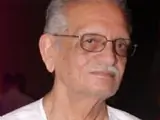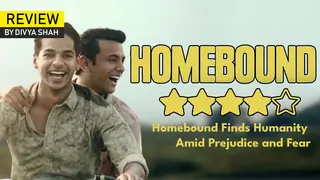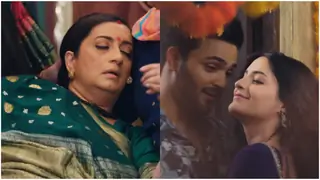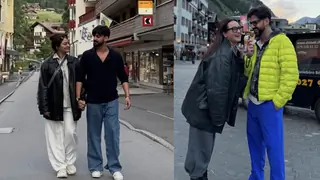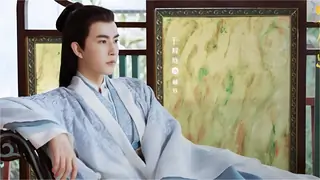Rajiv Vijayakar
The garden (gulzar) is in full bloom. With constant mutation brought about by changing times and trends, Gulzar's lyrics have issued forth virtually as a new species of poetic flowers in verse. The only commonality between the Gulzar of Omkara, Jaan-E-Mann and Guru and the earlier Gulzar is the instantly identifiable colour scheme. But the palette is fresh, and the fragrance perhaps a little more alluring this time.
We catch the poet-writer-director, who has just won the Hero Honda Star Screen Best Lyricist trophy for 'Beedi jalayale...' from Omkara, in an expansive mood as he elaborates on his journey with changing times, trends, thoughts and tones. Excerpts. You expressed your reservations about being awarded for 'Beedi jalayale...' from Omkara at the nomination stage.
I would like to say that there is no denying the importance of 'Beedi jalayale...' as a song and in my career. There is also no degrading or demeaning the importance of the Screen award or its jury. It is just that in every film, a poet has his own preferences, perhaps brought about by the situation and how much and what kind of creative efforts he made on each song. Last year, I won the Screen award, not for 'Kajraa re...', which was also hugely popular from Bunty Aur Babli, but for 'Naam ada likhna...' from Yahaan, which was very dear to me. You see what I mean - in the Yahaan song I got to use some imagery, which I have always been fond of, I used a Kashmiri phrase or two, and mentioned Kashmir. When it was chosen with 'Kajraa re...' as one of the other nominations, I was satisfied. Once again, let me be clear. I own 'Beedi jalayale...' and 'Kajraa re...' as much as 'Naam ada likhna...' . The difference lies in the fact that a poet always has his own likes, and his reasons for them. You also mentioned 'Naina...', 'Namak isaq ka...' and 'O saathi re...' as your choices from Omkara.
I think that Omkara as a score had a lot of variation and colours. In 'O saathi re...' I have used some rare poetic imagery wherein I describe sunset by saying that the sky is slippery so that the sun is about to slide into the water, but that can be prevented using a net or by holding it on one's back. The lines actually go as follows:
Hari hari kaayi pe paanv badhaa to phislega...
Tum rok ke rakhna main jaal giraoon...
Tum pith pe lena main haath lagaoon...
Din doobe na') I do not think anyone has used this kind of imagery before. Similarly in 'Naina thug lenge...' I use the parallel, 'Nainon ki zubaan pe bharosa nahi aata, likhad parakh na rasid na khaata...' and say that we cannot trust what the eyes say because there is no document in writing, no receipt and no account! Do you feel that understanding of such imageries, Hindi and Urdu in general, are at a premium nowadays, and you need a Vishal Bhardwaj or other good filmmakers to appreciate and incorporate such poetry?
Yes, the director and the lyricist need to go into the backdrop and depth of the film, the situation and the characters. I am supposed to be notorious for taking time to write songs, but that is essential. You have to dig to get water, and it is up to you to dig only a little and find some moisture or go deeper. Of course, when you dig deep enough, you may strike oil! But generally do you look on 'item' songs as compromises made with reluctance, and are they more difficult to write?
I think that film writing is a popular art, and the whole game is about communication with the masses. 'Item' songs are like situations created to accommodate a popular beat, but that's for the music director. As a lyricist, I am bound in every case by the situation, the story, the character and most important, the language fitting to that character. I make sure that the song has to be in the same idiom as the character's dialogues. Within these parameters, my question to myself would be, "What freshness can I bring within these boundaries?" Let us take the example of the title-song of Omkara. I have not written it just in a rural or tribal fashion, but in the style of Aala-Udhal. Aala and Udhal were two brave Rajput warriors who fought against the Mughals, and even today in Rajasthan, ballads are sung about their deeds, and these songs make for a genre of their own. I think that what is important are aesthetics. 'Beedi...' and 'Kajra re...' may be visually like 'item' songs, but there is no double-meaning and nothing offensive in them. The choices of the filmmakers speak for themselves. That does not really answer my question of whether you abhor writing at the out-and-out mass level.
Intentionally, in that sense, I do not write for the masses. I catch the situation instead. Some of the words I employ are in common use where the film is based, even if the city person may not know them. When I used the words 'lihaaf' and 'gilaaf' they stand for a garment and a pillow-cover respectively. I like to tread uncharted terrain. In 'Beedi...' itself the girl says that because she is beautiful not only are the boys teasing and flirting with her but the shopkeepers are willing to sell her goods on credit to please her. I used the word 'chhamiye' which means young men in colloquial Hindi and baniye, which means merchants. You have also stylized the use of English today in songs, beginning with 'Kajraa re...'.
In Khamoshi (1969) I had used the phrase 'My sister' because it was needed. I have never used English as a gimmick. I have started using English words and phrases when they seem natural and normal in context. That is why the use is seamless, because that's how most of us talk today. It was ingenious to rhyme 'shaayari' with diary in Jaan-E-Mann.
Here was a film where the characters were very urban and well-educated in English. Their dialogues were studded with English, so once again, why should the songs be different? Shirish Kunder's approach was unique - he was narrating a love story like animation, like a comic book, with images that stayed on. He used music in a very fresh way. For example, when each of the family members of the girl feel that she should marry one of the heroes he could have had various sequences about how they told the girl what they felt. But audio-visually he condensed it all into the song 'Kubool kar le...', which was like saying dialogues in songs. Shirish had made a storyboard, and the lyrics flowed from there, with phrases like 'Shaadi ke liye agree nahin kiya...' and 'Taaron pe chalna-valna easy nahin...' In 'Humko maloom hai...' we had to condense a 10-minute scene into a few lines, to show that the girl's parents did not accept her man. I brought in intimacy with the words, 'Mom maani nahin, Dad naaraaz the...'. One of my fans told me that he realized that I had used English words weeks after listening to the song, because this is how we speak in real life! And tell me, can you think of a Hindi or Urdu word for a pullover, a diary or a note-book? With pullover the buck stops at sweater - which is also an English word! Would you use English in your non-film shaayari?
I have used it. It is part of our natural way of expression. I do not see any compromise in aesthetics there. The borders between English and all our languages has been blurred anyway. Cup, glass, ticket, film, mummy, daddy - they are all English words. Should we translate coffee as 'maya' (liquor) or lawn as 'ghaas ka maidan' and call tennis as 'gend-balla'? I think that poetry must touch today's life and must reflect the era in which it is written. That would mean that what was being done all these years was not very natural.
I agree - that was artificial language. A living language is always imbibing words from other languages, like English itself. Only a dead language can be a classic! Your last four films show a synergy with young filmmakers and composers.
Yes, but I would prefer to point out that all four are completely different films where my language and styles are completely different from each other. There are lyricists who are known to be very good but write all kinds of subjects in the same language. I think that being different and variegated is even more important than just being a good poet! You have always had an extraordinary result with A.R.Rahman, who unlike you barely knows Hindi and Urdu. How do you explain foolproof joint collaborations like Dil Se..., Saathiya and now Guru?
I think that music directors, like lyricists and singers, have a very keen sense of the most delicate tonal variations in sound. When we work together, I like to travel with my words as usual and he likes to travel with what he can do in music that is innovative. But the results come because both of us are travelling with the film. Also, a quality that Rahman has is that he has totally changed the format of our songs - with him it is not necessary to have the conventional mukhda-antara-mukhda structure. His songs often run like a free verse poem, and free verse eminently suits me! Guru is yet another example of how I mentally go and park myself into the character's psyche in a situation. Aishwarya Rai's song 'Barso re...' has all the images associated with a village. Abhishek Bachchan's songs have liberal Urdu and Persian as he has worked in Turkey, and I have maintained this even in their duets! In fact in one song the heroine even asks him in a line, 'Kyoon Urdu-Pharasi bolte ho?' All these small nuances are not noticed most of the time and rob you of well-deserved appreciation.
How can I be in-your-face about it? It's all about being honest to your work. From old-timers to R.D.Burman and then Anu Malik, Rahman and Vishal Bhardwaj you move one more generation ahead to Pritam in Just Married. How was the rapport there?
Pritam has a very strong sense of melody apart from his inclination for Western music. His music in this film is completely different from his normal scores. I have again gone with the story and even referred to snoring in one of the songs, because snoring as a daily quirk achieves importance when a boy and a girl in an arranged marriage go for a honeymoon! What made me happy about Just Married is that my daughter Meghna is so much aware of small-town middle-class sensibilities after narrating an urban, upper-class story in Filhaal. She even made Pritam stick to the right instruments. Many years ago, when Jagjit Singh scored my Ghalib, I had asked him to ensure that no instruments that were not around in Ghalib's time should be employed. How has the music of The Blue Umbrella shaped up?
I think that after Pancham, the only composer I know who is great at children's songs is Vishal Bhardwaj - they both share this childish streak. I have done a lot of work with him from dubbed animation films to Makdee and a Tom & Jerry series.
What is coming up next?
I am doing Shaad Ali's Jhoom Barabar Jhoom and an album for children.









